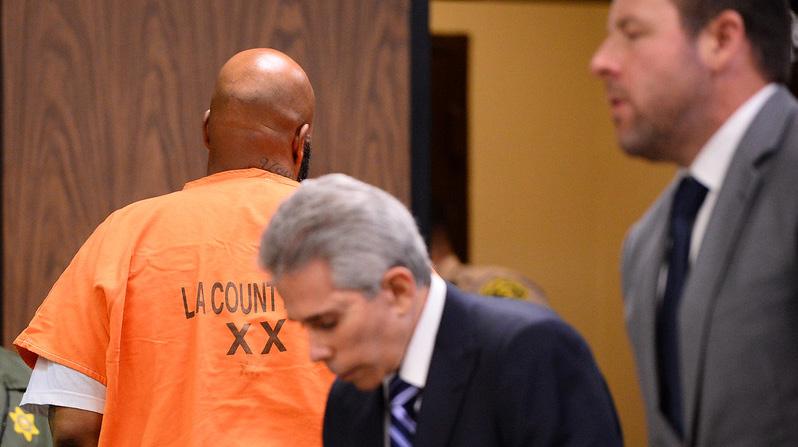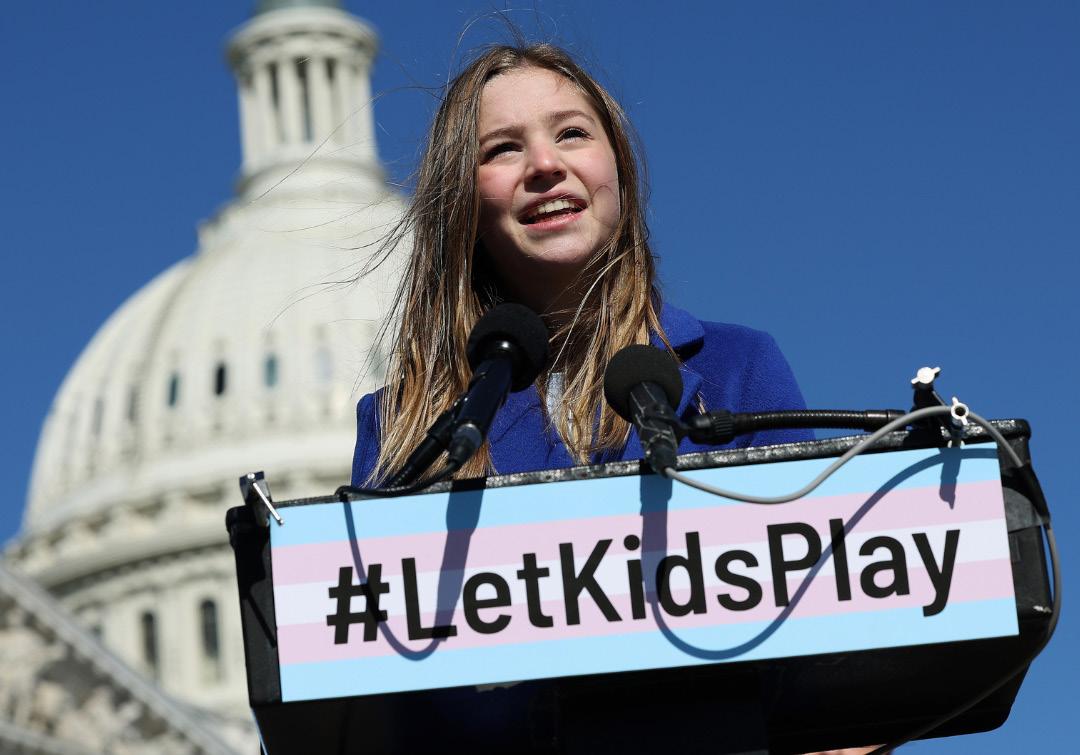
7 minute read
Former ‘Suge’ Knight attorney sentenced in conspiracy, perjury case
By City News Service
An attorney who briefly represented former rap mogul Marion "Suge" Knight in what was a murder case at the time was sentenced Tuesday to five years probation and ordered not to practice law in California in connection with his guilty plea to conspiracy and perjury charges.
Advertisement
Matthew Powell Fletcher, now 58, pleaded guilty in February 2022 to one felony count each of conspiracy to obstruct justice in Knight's case and perjury under oath stemming from a State Bar disciplinary proceeding involving a separate murder case.
Under a plea agreement reached with prosecutors as jurors were deliberating in his trial, Fletcher was required to resign from the State Bar of California and not to apply for reinstatement to practice law again.
"I give up," Fletcher told City News Service as he walked out of the courtroom last year following his plea.
Fletcher, a Long Beachbased attorney, had practiced for more than 24 years. He was disbarred on Jan. 27, according to records from the State Bar of California.
Fletcher represented Knight for a short time in a case in which the former rap mogul eventually pleaded no contest to voluntary manslaughter for running over a man with a pickup truck in the parking lot of a Compton hamburger stand.
Fletcher was indicted by a Los Angeles County grand jury just over four years ago on one count each of conspiracy to commit bribery, conspiracy to suborn perjury, conspiracy to obstruct justice and accessory after the fact involving Knight's case. He was also indicted on one count of perjury under oath involving his testimony at a State Bar hearing involving whether he had texted the brother of a defendant in another case and provided him his banking information.
In his closing argument, Deputy District Attorney Stefan Mrakich reminded the jury of his remark in his opening statement that Fletcher's "own words will bury him," arguing that Fletcher and others were involved in a conspiracy to either get the case against Knight dismissed or for Knight to be acquitted through false testimony when they knew that he was guilty.
Fletcher -- who was acting as his own attorney and was not in the courtroom when Mrakich gave his closing argument -- told jurors that he had proven that the entire working theory of the case was "wrong" and accused prosecutors of making personal attacks "when they know what they're saying is baloney."
"There is no evidence that I gave anyone anything, none," he said in his closing argument, telling the panel that he had challenged prosecutors to call in a witness to say that he had offered to pay anyone even a penny.
"They have no evidence that I ... entered into a conspiracy with anybody," Fletcher said.
He told jurors that they "have to vote not guilty" and that "the only people who can stop this insanity is you guys."
Deputy District Attorney Phil Stirling told the jury in his rebuttal argument that Fletcher is "wildly dishonest at the highest level," arguing that Fletcher "has lied to you repeatedly."
"You can't have a justice system that allows attorneys to lie and manipulate. ... We need this system to be pure, as pure as possible," the prosecutor said in his rebuttal argument before jurors were handed the case. "This case is entirely about dishonesty."
In one jailhouse recording, Fletcher told Knight in March 2015 that $20,000 to $25,000 would be a fair investment to secure his freedom.
Fletcher also told an informant for the Los Angeles County Sheriff's Department in May 2016 that witnesses in Knight's case needed to be paid for their testimony, and subsequently told Knight that Cle "Bone" Sloan, who survived being struck by
By Eliza Siegel, Data Work By Emilia Ruzicka, Stacker
On March 2, 2023, Tennessee passed a law criminalizing drag performances—the first of its kind since anticrossdressing laws were introduced in the mid-1800s.
Drag shows, a fixture of the queer ballroom scene starting in the 1920s, have ballooned in popularity in recent decades, entering the mainstream via films like 1990's "Paris is Burning" and shows like "RuPaul's Drag Race."
Tennessee frames its new crackdown on drag as a measure to protect children from witnessing "sexually explicit performances." The stance has drawn criticism for targeting a medium that plays with gender in highly performative ways, but also how it could impact the safety of transgender, nonbinary, intersex, and gender nonconforming Tennesseans or visitors to the state.
the truck, needed to be paid money for his testimony, according to the grand jury indictment that was handed up in January 2018.
Knight -- who was initially charged with murder for Terry Carter's Jan. 29, 2015, death -pleaded no contest in October 2018 to voluntary manslaughter and admitted that he used a deadly weapon, a truck, during the commission of the crime in the parking lot of Tam's Burgers in the 1200 block of West Rosecrans Avenue.
Knight is serving a 28-year state prison term.
Another of Knight's former attorneys, Thaddeus Culpepper, was also indicted and is due in a downtown Los Angeles courtroom April 10 for a pretrial hearing.
Mark Blankenship, a one-time business partner of Knight, pleaded no contest in June 2019 to a felony conspiracy charge stemming from the sale of video footage of the crime and was immediately sentenced to five years probation.
Knight's fiancée, Toi-Lin Kelly, pleaded no contest in 2017 for conspiracy to violate a court order involving video evidence that was under seal, and she was subsequently sentenced to three years in jail for violating her probation by having indirect communication with Knight and helping him violate orders restricting his use of jailhouse phones.
The law's language, which vaguely prohibits "male or female impersonators" from performing publicly, leaves so much room for interpretation—to the point that some are worried trans and genderqueer individuals might be targeted.
Tennessee is not alone in proposing anti-drag legislation—at least 14 other states have proposed similar laws. And legislation targeting drag performers barely scratches the surface of the spate of anti-transgender laws that have emerged in legislatures nationwide—over 420 bills as of March 21, 2023.
Similar to the anti-drag bills, many of the proposed laws across states bear a striking resemblance to each other, targeting the same rights and using almost identical language. To break down these legislative patterns, Stacker investigated seven common types of anti-transgender bills that have passed or failed in the last 10 years using data from the ACLU. Some of the bills tracked fall into multiple categories. ACLU last updated its data on March 21, 2023.
Schools and education
-Number of bills during 2023 legislative session: 205 Legislation limiting the rights of trans students in schools has swept state legislatures, becoming the most common type in the country.
These bills cover a wide swath of school activities and domains, ranging from student athletics to classrooms and curricula. In 19 states, anti-trans bills passed over the last several years have banned trans kids' participation in school sports, requiring that students compete on teams that match their sex assigned at birth rather than their gender identity.
Some proposed bills, like one passed by the Ohio Senate in 2022, have gone even further, mandating an examination of kids' "internal and external reproductive anatomy," not just for openly trans students, but for anyone whose gender was in question. The Ohio House shot down the bill in late 2022.
Other types of school-related anti-transgender legislation require teachers to out their students to parents, regardless of whether or not their situation at home is safe. Still others, like the "Don't Say Gay" laws passed in Florida and several other states, censor teachers and curricula, preventing them from discussing LGBTQ+ history and figures.
Human rights organizations, including the ACLU and Human Rights Campaign, as well as health care providers, have raised alarms about these laws, warning that they
Continued From Page 8 adversely impact transgender students physically and psychologically.
Health care
- Number of bills during 2023 legislative session: 116
Anti-transgender health care laws limit or outright ban gender-affirming medical care both for young people and adults, and almost always disproportionately impact low-income trans and nonbinary people.
One way in which some states use anti-trans health care laws to target poorer trans people is by limiting or banning insurers—including Medicaid—from covering gender-affirming health care like hormone therapy, surgery, and fertility services. Despite Medicaid's federally guaranteed sex and gender discrimination protections, very few states mandate the coverage of all genderaffirming health care services under Medicaid. In Texas and Alabama, no gender-affirming services are covered.
Other anti-trans health care laws specifically target trans youth by banning gender-affirming care for minors. In Utah, Arkansas, and Alabama, bans on gender-affirming care have already passed, and similar bills have been proposed in many other state legislatures. Some bills go so far as to open health care providers to potential lawsuits or even criminal charges for giving gender-affirming care to young people.

Anti-trans health care bills continue to crop up in states across the country, despite overwhelming evidence from the nation's leading medical and scientific organizations that genderaffirming care is medically necessary, safe, and beneficial to trans and nonbinary people.
Free speech and expression
- Number of bills during 2023 legislative session: 41
Many of the dozens of anti-trans bills limiting free speech and expression introduced over the past two years target drag performers and shows. The bills call them "adult cabaret performances" and use language that relegates drag to categories including obscenity and pornography, and even erotic performance—language that suggests exposure to drag is dangerous for minors.
While these laws directly threaten drag performers, the vagueness of the language used has made it unclear whether people who appear to be gender nonconforming while in public will also be at risk of prosecution. The ACLU of Tennessee's Henry Seaton called the Tennessee drag ban a "subtle and sinister way to further criminalize just being trans."
Anti-trans legislation that curtails free speech and expression also includes bans on or censorship of books or other materials that deal with transgender or LGBTQ+ subject matter. Bills that would ban schools and public libraries from offering books with themes exploring nonheterosexual orientation and gender identity have been proposed in states including Indiana, Mississippi, Iowa, and Missouri. So far, most of these bills have failed to pass.
Civil rights
- Number of bills during 2023 legislative session: 32
Legislation attempting to protect religious freedom at the expense of LGBTQ+ civil rights is hardly unprecedented. Over the past decade, dozens of bills have been introduced that seek to use loopholes—including religious expression—in established anti-discrimination laws to deny LGBTQ+ people services, rights, and freedoms. These have included the issuance of marriage licenses—even after the Supreme Court ruled in favor of LGBTQ+ marriage— and matters regarding business owners, adoption and foster care agencies, and access to health services.
More recently, anti-trans bills targeting civil rights have reemerged, using similar logic to allow businesses, employers, and even medical providers to turn away LGBTQ+ people based on religious or "moral" beliefs.
Lawmakers in Iowa,






